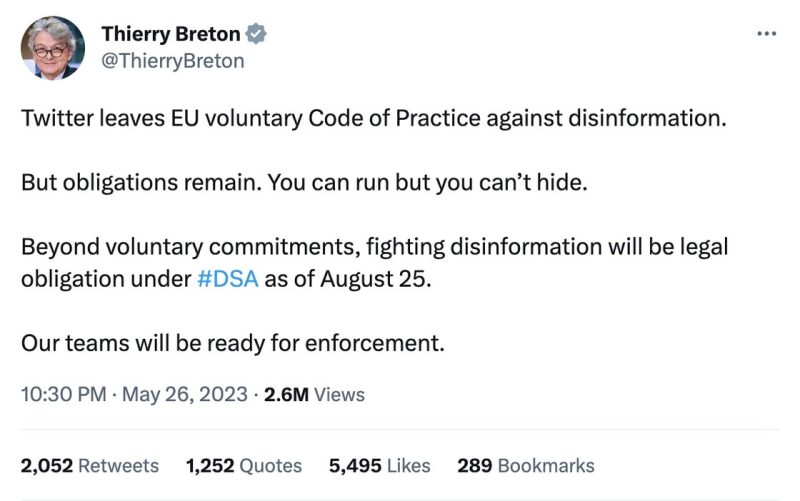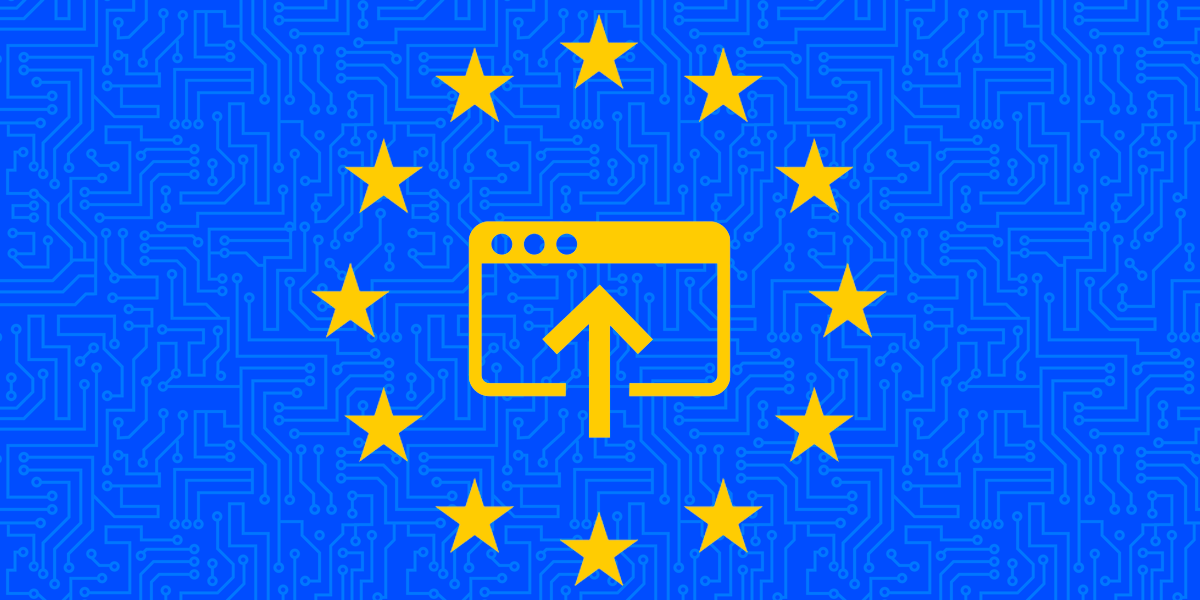The European Union’s Internal Market Commissioner, Thierry Breton, was apparently miffed that Elon Musk withdrew Twitter from the EU’s “voluntary code of practice against disinformation.” He was sufficiently put out by Twitter’s withdrawal from the “voluntary code” that he felt the need to publicly reprimand Twitter for not gratefully submitting to the European Union’s expert guidance: “You can run but you can’t hide…Beyond voluntary commitments, fighting disinformation will be legal obligation under Digital Services Act as of August 25th.”

The declared aim of the new Digital Service Act is “to contribute to the proper functioning of the internal market for intermediary services by setting out harmonised rules for a safe, predictable and trusted online environment that facilitates innovation and in which fundamental rights enshrined in the Charter, including the principle of consumer protection, are effectively protected.”
*Click here to give some extra support to my work by upgrading to a paid subscription*
Who can argue against a “safe, predictable and trusted online environment”? Who would argue against “consumer protection”? And who would argue against Mr Breton’s commitment to the fight against “disinformation”?I certainly would, because when a person or institution in a position of great power endorses values like “predictability,” rails against “disinformation,” and promises to keep us all “safe” on the internet, you can be sure that it will be “safety,” “predictability,” and “disinformation,” as viewed from their self-serving ideological and political perspective.
I am just as worried as Mr Breton about “disinformation,” but my chief concern is with disinformation coming from official sources, which can do an extraordinary amount of harm due to the extraordinary reach and prestige of official organisations. It is these same organisations that Mr Breton would like to put in charge of policing “disinformation”: organisations like national governments, that have been among the most frequent perpetrators of false and misleading information, on matters of no small moment, from the efficacy and safety of Covid vaccines, masks and lockdowns to the origins of the SARS-CoV-2 virus, the true standing of climate “science,” and the potential harms to the economy and food supply chain of aggressive climate interventions such as the expropriation of farmland.
Privacy Action Plan – Live Your Life Online Again With Zero Fear
(Sign Up Risk-Free Today)
The Digital Services Act is an endless maze of complicated regulations worthy of a team of lawyers. Seeing as I don’t have a budget to hire a team of lawyers, I decided to skim through the Act for myself. It does not make for pleasant bedtime reading, not only because it is a morass of complicated legalese, but also, because what hides behind this legalese is an attempt by EU politicians to get social-media platforms under their thumb, through
- the obligation on the part of social-media companies to periodically submit content moderation and “risk mitigation” reports to EU bureacrats
- EU supervision of social-media platforms’ policing of “harmful” information, which could potentially include health misinformation as well as “illegal hate speech”
- the creation of new emergency powers in the European Commission to “require” social-media platforms to take actions to “prevent, eliminate or limit” any use of their services that might “contribute” to a “threat” to public security or public health
…and all backed up by crippling fines of up to 6 percent of a company’s worldwide turnover for non-compliance. Yes, you heard that right: up to six percent of a company’s worldwide turnover.
At bottom, the Digital Services Act is an attempt to ramp up the level of control that EU bureacrats have over the flow of information on social-media platforms. You would have to have a very short historical memory to think that broad powers of censorship will generally be used to advance the cause of truth and justice. Whether Mr Thierry Breton and his colleagues will be successful in forcing social-media companies to do their bidding, this much is clear: the Digital Services Act creates a European legal environment that is increasingly hostile to free speech.
Republished from the author’s Substack
Source: Brownstone Institute
David Thunder is a researcher and lecturer at the University of Navarra’s Institute for Culture and Society in Pamplona, Spain, and a recipient of the prestigious Ramón y Cajal research grant (2017-2021, extended through 2023), awarded by the Spanish government to support outstanding research activities. Prior to his appointment to the University of Navarra, he held several research and teaching positions in the United States, including visiting assistant professor at Bucknell and Villanova, and Postdoctoral Research Fellow in Princeton University’s James Madison Program. Dr Thunder earned his BA and MA in philosophy at University College Dublin, and his Ph.D. in political science at the University of Notre Dame.
Image: EFF
Become a Patron!
Or support us at SubscribeStar
Donate cryptocurrency HERE
Subscribe to Activist Post for truth, peace, and freedom news. Follow us on SoMee, Telegram, HIVE, Flote, Minds, MeWe, Twitter, Gab, What Really Happened and GETTR.
Provide, Protect and Profit from what’s coming! Get a free issue of Counter Markets today.


Be the first to comment on "Europe’s Digital Services Act Puts Free Speech at the Mercy of Eurocrats"